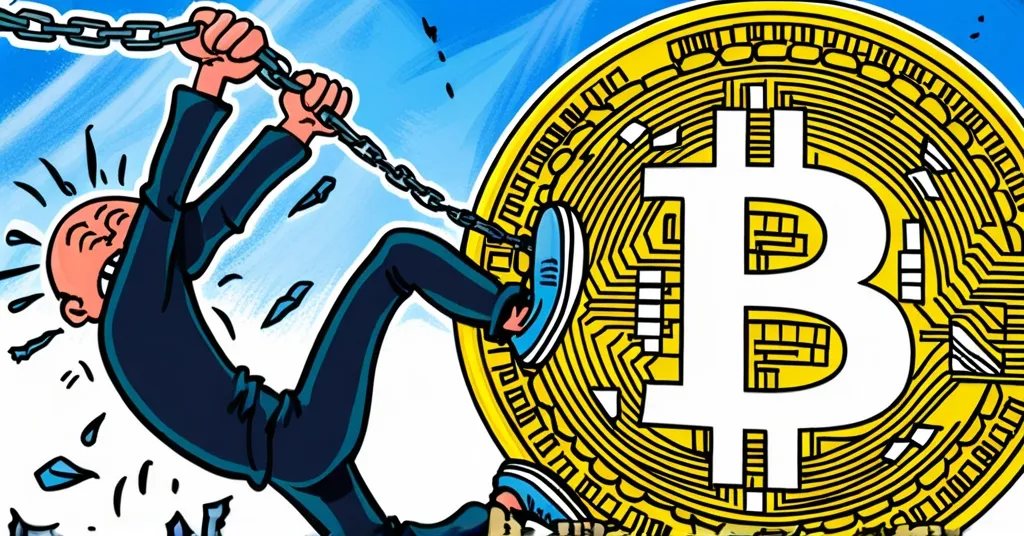Trump Pardons Silk Road’s Ross Ulbricht: A Crypto Community Milestone

Donald Trump Pardons Silk Road Creator Ross Ulbricht: A Milestone for Crypto and Criminal Justice
In a move that’s sparked a whirlwind of celebration across the cryptocurrency community, former President Donald Trump has granted a full and unconditional pardon to Ross Ulbricht, the man behind the infamous Silk Road darknet marketplace. This decision not only fulfills a campaign promise but also reignites discussions on Bitcoin’s role in criminal justice reform and the broader implications for decentralized technologies.
- Ross Ulbricht pardoned by Donald Trump
- Silk Road’s impact on Bitcoin and criminal justice
- Crypto community’s reaction and future implications
Ross Ulbricht’s story begins in 2011 when he launched Silk Road, an online platform that became notorious for enabling the sale of illegal goods and services using Bitcoin. A darknet marketplace is an online platform accessible only through specialized software, typically used for anonymous transactions. Bitcoin was pivotal for Silk Road as it allowed for these anonymous transactions, crucial for the marketplace’s operation. Ulbricht’s arrest by the FBI in 2013 and his subsequent conviction in 2015 on charges including planning to sell illegal drugs, money laundering, and computer hacking, resulted in a severe sentence: two life sentences plus 40 years without parole. This harsh penalty has long been a sore point among Bitcoin enthusiasts and criminal justice reform advocates.
Trump announced Ulbricht’s pardon in a mic-drop moment on his Truth Social platform, describing the sentence as “ridiculous.” This move followed sustained advocacy from figures like Representative Thomas Massie and Senator Rand Paul, who have been vocal about the need for Ulbricht’s release. Trump’s decision was framed as a gesture of appreciation towards the Libertarian Movement, which supported his campaign.
The crypto community’s reaction has been nothing short of jubilant, with social media platforms buzzing with celebrations. For many, Ulbricht’s pardon isn’t just about his personal freedom; it’s a symbol of the broader issues within the criminal justice system and the potential for cryptocurrencies to challenge traditional financial systems.
Yet, while the pardon is celebrated by many, it also brings up the darker aspects of Silk Road, which facilitated illegal transactions. This complexity underscores the ongoing debate about the role of cryptocurrencies in society. While they are championed for promoting financial freedom and privacy, they also face criticism for enabling illegal activities. Silk Road’s existence demonstrated Bitcoin’s practical utility and its potential for disrupting the status quo, even as it highlighted the challenges of regulation.
As we navigate the ever-shifting landscape of digital currencies and decentralized technologies, Ulbricht’s pardon serves as a reminder of the intersection between technology, politics, and the law. It prompts us to consider the future of criminal justice reform and the role that cryptocurrencies might play in shaping a more equitable and free society.
This pardon is part of a larger conversation on criminal justice reform, where cryptocurrencies like Bitcoin are seen as tools for financial freedom. Ulbricht’s trial was controversial, with debates over the severity of his sentence and the legality of the FBI’s methods in capturing him. The pardon raises ethical questions about the use of cryptocurrencies for illegal activities and the role of political influence in justice. This event may encourage further discussions on how cryptocurrencies can be regulated to prevent misuse while still promoting financial freedom.
For those in the crypto community, Ulbricht’s story is personal, symbolizing both the potential and the pitfalls of Bitcoin. It’s a reminder that while Bitcoin and other cryptocurrencies have the power to revolutionize finance, they also come with responsibilities and challenges. As we celebrate this milestone, we must also remain vigilant about the ethical considerations and the need for balanced regulation.
Key Takeaways and Questions
- What did Ross Ulbricht create?
Ross Ulbricht created Silk Road, a darknet marketplace that facilitated the sale of illegal products and services using Bitcoin.
- What was Ross Ulbricht’s sentence?
Ulbricht was sentenced to two life sentences plus an additional 40 years without the possibility of parole for charges including planning to sell illegal drugs, money laundering, and computer hacking.
- Who pardoned Ross Ulbricht?
Former President Donald Trump pardoned Ross Ulbricht.
- Why did Donald Trump pardon Ross Ulbricht?
Trump cited the disproportionate nature of Ulbricht’s sentence as “ridiculous” and mentioned his promise to the Libertarian Movement, which supported him, as reasons for the pardon.
- How did the crypto community react to the pardon?
The crypto community reacted positively, with widespread celebrations and expressions of gratitude on social media platforms.
- What role did political figures play in advocating for Ulbricht’s pardon?
U.S. Representative Thomas Massie and Senator Rand Paul were among the political figures who advocated for Ulbricht’s release, with Massie publicly thanking Trump for keeping his word and Paul writing a letter to Trump urging the pardon.
“I just called the mother of Ross William Ulbricht to let her know that in honor of her and the Libertarian Movement, which supported me so strongly, it was my pleasure to have just signed a full and unconditional pardon of her son, Ross.” – Donald Trump
“It was ridiculous that he was given two life sentences plus 40 years.” – Donald Trump
“Ross Ulbricht has been freed by President Trump with a full pardon! Thank you for keeping your word to me and others who have been advocating for Ross’ freedom, Mr. President! #freeRoss” – Representative Thomas Massie
“Ross was just granted a FULL AND UNCONDITIONAL PARDON by @realDonaldTrump. Words cannot express how grateful we are. President Trump is a man of his word and he just saved Ross’s life. ROSS IS A FREE MAN!!!!!” – Free Ross campaign account



